The Class is the story of François and his fellow teachers prepare for a new year at a high school in a tough neighborhood. Armed with the best intentions, they brace themselves to not let discouragement stop them from trying to give the best education to their students.
Cultures and attitudes often clash in the classroom, a microcosm of contemporary France. As amusing and inspiring as the teenaged students can be, their difficult behavior can still jeapordize any teacher’s enthusiasm for the low-paying job. François insists on an atmosphere of respect and diligence. Neither stuffy nor severe, his extravagant frankness often takes the students by surprise. But his classroom ethics are put to the test when his students begin to challenge his methods…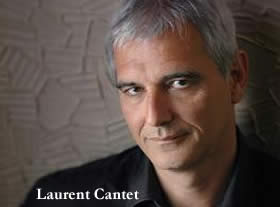
Laurent Cantet (Director/Co-Screenwriter) was born in 1961 in Melle, France. THE CLASS (Entre les murs) is his fifth feature.
Bijan Tehrani: Did the idea for making The Class stem from reading François Bégaudeau’s book?
Laurent Cantet: It started before, because I wrote the first script two years before meeting François and reading his book. I wanted to spend time in a school in order to bring real life appearance to the film. I wanted it to be very realistic. So I didn’t know at that time what was really happening within a school, because when you are not a teacher or a student you don’t know. So I was preparing myself to go and observe what was happening in a real class. Then I read the book by François, who was a teacher, and it gave me an insider’s point of view. He gave me the material for the flesh and meat of the film. We discussed it, and he was very happy to work with me, because he had seen my previous films and liked them. It was quite easy for me to convince him to act in the film, because I think he understood exactly the way I wanted to work; leaving a lot of space for improvisation. Of course I needed the actor to be very close to the character I wanted to create. He played the part quite easily.
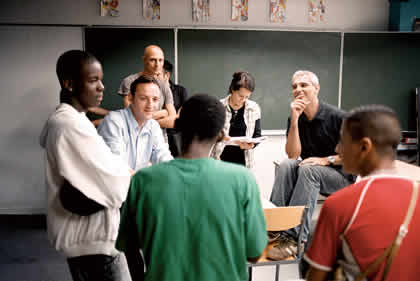 BT: How much did you borrow from the book in making The Class? Is there any trace of his book in the film?
BT: How much did you borrow from the book in making The Class? Is there any trace of his book in the film?
LC: Yes, you have some scenes that come directly from the book. Others scenes start just like the book, and then we decided to see the way the same scene from the book would progress according to the class that we formed. The main link between the book and the film is certainly the teacher himself and the way he is speaking to the children; the way he tried to provoke them to think, and to make them analyze things.
BT: Was there a script writing process that you went through?
LC: Yes, of course. We have a real script that is 100 pages, with dialogue and very precise articulation between the scenes. Some of the lines of the script are just given as an indication of what could be said, but some of them are very precise. Occasionally, I just wanted to hear how some of the lines sounded in the film, so I asked the children to insert these lines into the improvisation. At the end, when you read the script again, you realize that it is quite close to what we finally made.
BT: Was François a part of writing the script?
LC: In fact he did not actually write with us. I wrote the script with one of my friends who wrote all of my previous films. But François read each step of the script, telling us if he could believe a scene or not, like an advisor for the writing. He was also very active in the writing by participating in the workshop. We organized a workshop in the school, and every Wednesday afternoon we met with children, and we experimented with different situations, and François was improvising with them. He got to know the children, and we agreed together on the scenes, and this is what allowed him during 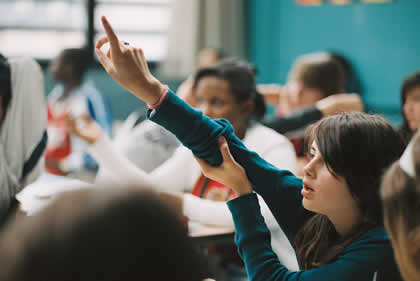 the shooting to be a director from the inside. I trusted him enough to drive the scene while we were shooting.
the shooting to be a director from the inside. I trusted him enough to drive the scene while we were shooting.
BT: Did all the children in the film come from the same school?
LC: Yes. They were all from the same Junior High School in Paris. They knew each other, but were not all in the same class.
BT: Was it like the same kind of school that François writes about in his book?
LC: Quite similar, yes. François’s class was a little bit more difficult than the one we created. I wanted this class to be as diverse as possible, with different ethnicities, and with students who are very good and ones that don’t understand, students who speak a lot and students who don’t say one word. It was important for me to have this kind of diversity because it really looks like a lot of classes in France. I think it also represents our society.
BT: Did you start shooting during the workshop?
LC: During the workshop we sometimes shot with a small camera in order to write from what we saw. But the shooting was done during summer holiday, and the children stayed in school for five additional weeks. We made the film in seven weeks.
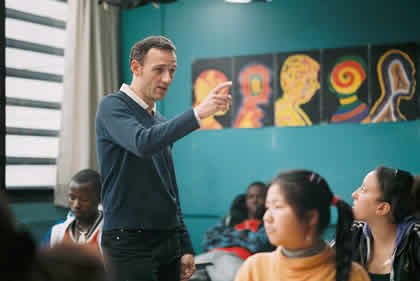 BT: How did the kids respond to the camera? How many cameras were in the room? Were they all shooting at the same time?
BT: How did the kids respond to the camera? How many cameras were in the room? Were they all shooting at the same time?
LC: We had three cameras. It was never a problem for the kids to ignore the cameras. I think they are part of a generation that has no problem with that, because they are used to it, and know how a film is supposed to be made. They are used to reality TV. The camera did not intimidate them.
BT: Yes, and they have cameras on their cell phones.
LC: Yes. I never had to tell them not to look at the camera. They never looked at it during the whole shooting. They were not impressed by the techniques that we used. I remember that the day before shooting we had a general rehearsal to see if everything was working well, and they entered the classroom and the ceiling was covered buy lights, we had three cameras, two sound booms, and mics hanging. They just entered the room, went to their seats and started to improvise as if nothing was around them.
BT: How much did they believe in the situation, and how much were they just being themselves?
LC: I think it was very clear to them that we were making a film and that we were reenacting the reality. They were not themselves, but were real actors. I think they were even protected by the characters I asked them to play, which allowed them to be a little more sincere. I think it helped them.
BT: There are directors who work with the real people and amateurs, and believe that those people should play themselves in order to be real. There are also directors like you who seem to believe that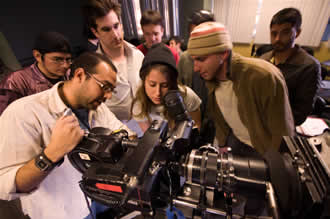 if they play a different person they will be more real and honest.
if they play a different person they will be more real and honest.
LC: Yes, I think so. It is quite paradoxical, but I think that is right. Even if the characters are sometimes quite close to what they actually are. But what makes them really believe is that we (the audience) are not watching them, but their character. They know that they won’t be judged; they accept that their talent may be judged, but not themselves as a person. And that frees them up to play their roles.
BT: What about the parents in the film. Were they professional actors?
LC: No, the parents are the real parents of the kids. We went through the same process with the parents. I met with them and discussed all the expectations they had for their children, what they think of school, what they expect from school for their children. We had very long takes, and in the end we were always trying to be more precise in each take.
BT: And the teachers of the school were they actors?
LC: All the teachers are the real teachers of this school. That is also why I chose this school, because they really showed from the very beginning of the project that they were involved in it, and they wanted to participate. It was a real collaboration between them and me. It was very interesting to me to know exactly what they think about their jobs.
BT: It is a very amazing film that carries you from beginning to end. But weren’t you worried about shooting almost all of the film in a classroom, and worried about how the audience would react to this?
LC: I trusted by own reaction to what was happening. I was really captivated by what was happening in front of me, I couldn’t stop the camera when I was shooting. I was always surprised by what was happening. Things always happen a little bit faster than what you imagine when you are a spectator. In fact you are always running behind the film, and I think this is what makes the film very exciting from beginning to end.
BT: Did you show this film to the students when it was completed? What was their reaction?
LC: Yes, of course. The first reaction of the children was that they were very surprised that it looked like a real film. For them we had made a very small experimental film, but they saw a film they could have seen in the theater and they didn’t realize this when we were 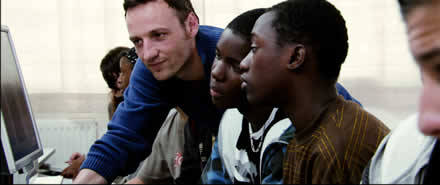 filming. After that we had a screening in Cannes, which was very important for them, because they were not used to being applauded. At that moment they really felt like the audience and jury rewarded their talent and hard work. It was very important for them.
filming. After that we had a screening in Cannes, which was very important for them, because they were not used to being applauded. At that moment they really felt like the audience and jury rewarded their talent and hard work. It was very important for them.
BT: In the history of French cinema, and cinema verite, I think this film is a real step forward. It changes the way we deal with reality in cinema. Are you going to make more films like this?
LC: Yes, I think I found with the film a way of working that really fits what I have to say. I would like to try to experiment with the same method in working with other subjects to see if it can be done, for example, with a period film, or something like that. With non-professional actors, two or three cameras, and leaving a lot of space for what people bring to the film. I am not sure what my next project will be, but I am sure I will try to make it the same way.
BT: I think this is an amazing film, because by watching it you can really see what is going on in French society today. What was the editing process of this film?
LC: We had 150 hours of rushes. It was obviously a huge amount of work to do. We worked four and a half months on the editing. This was a huge puzzle, because we had numerous camera angles, and it was very difficult to even memorize all the takes. It was easy at the same time, because I never doubted it. We just had to recreate the impression of real time in the
scenes. That was the most difficult task.
* ELMA (European Languages and Movies In America) has supported Cinema Without Borders to bring you this coverage. ELMA‘s mission is to create new avenues for better cultural understanding between the people of Europe and the USA by celebrating alternative cinema and language study.

